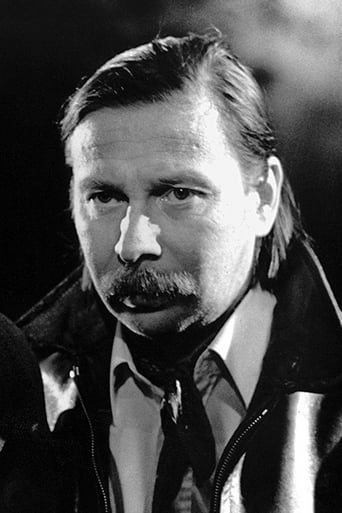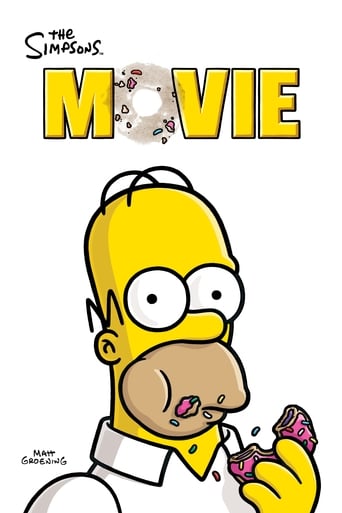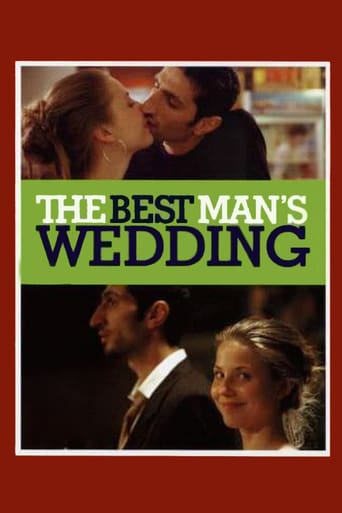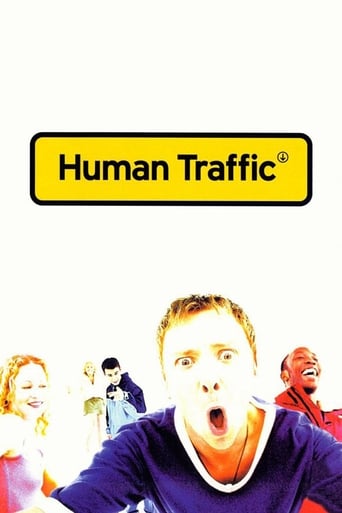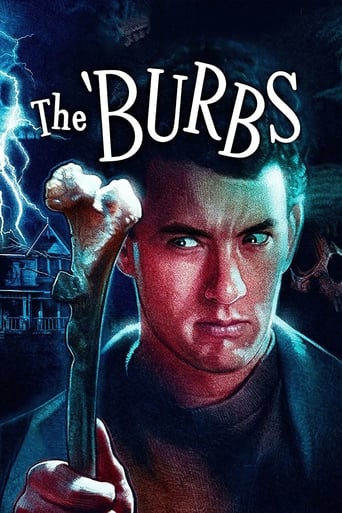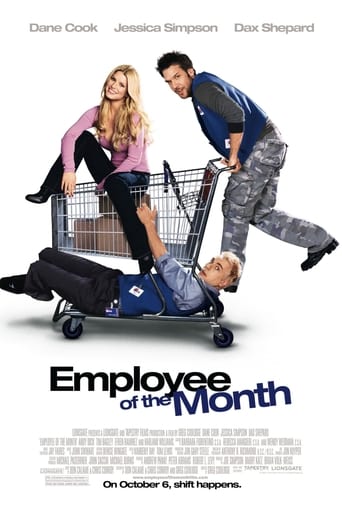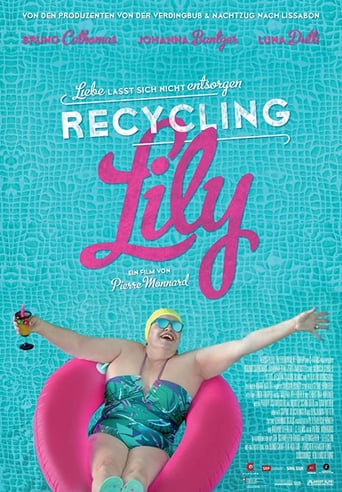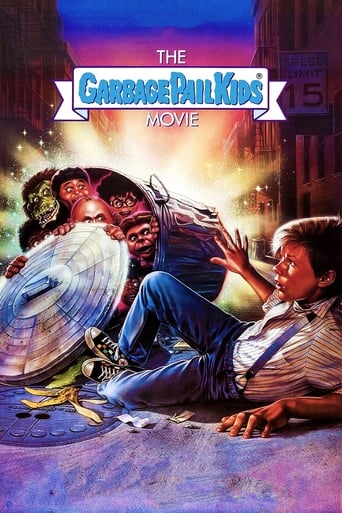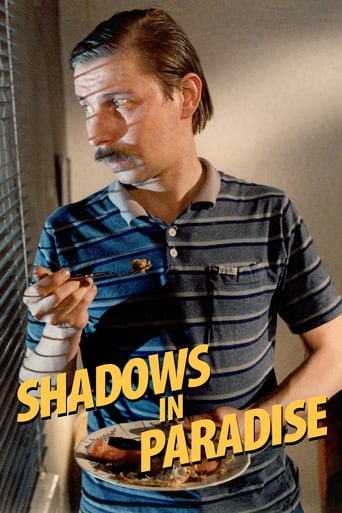
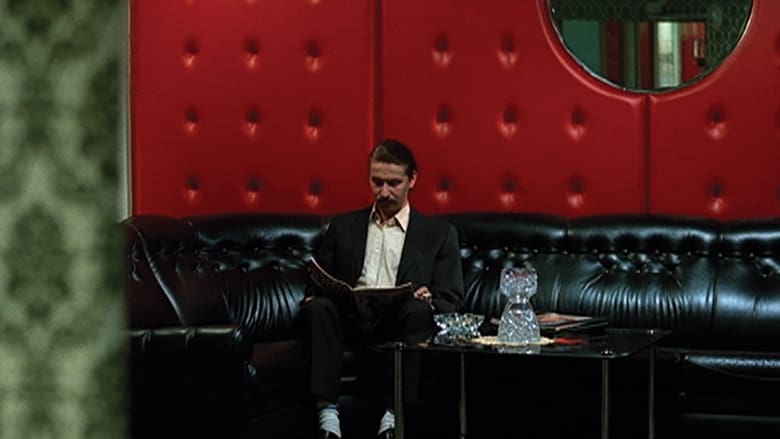
Shadows in Paradise (1986)
Nikander, a rubbish collector and would-be entrepreneur, finds his plans for success dashed when his business associate dies. One evening, he meets Ilona, a down-on-her-luck cashier, in a local supermarket. Falteringly, a bond begins to develop between them.
Watch Trailer
Cast
Similar titles
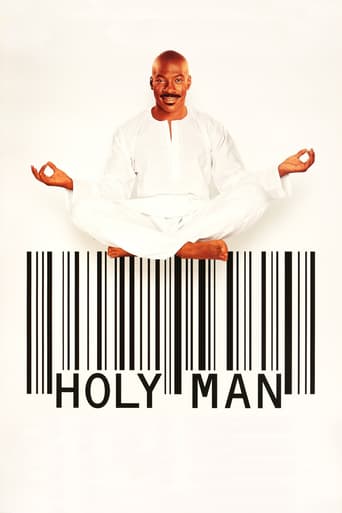
Reviews
Too many fans seem to be blown away
I wanted to but couldn't!
Great movie! If you want to be entertained and have a few good laughs, see this movie. The music is also very good,
Although I seem to have had higher expectations than I thought, the movie is super entertaining.
Finnish writer and director Aki Kaurismaki's third feature film is the first in his trilogy about the Finnish working-class which was succeeded by "Ariel" (1988) and "The Match Factory Girl" (1990). It tells the story of middle-aged garbage driver Nikander who is approached one day at work by his colleague who has decided that he refuses to end his days behind the steering wheel. Nikander's friend presents him with an idea about starting an own company and wants him as his partner. Nikander likes the idea, but when his friend dies from a heart attack the following day, Nikander loses his faith. Nikander continues his days with driving garbage and attending an English course until the day he spots cashier lady IIona. Nikander invites her out on a date, but she loses interest in him when he brings her along to play bingo. Nikander proceeds with his ritualistic life, but the day IIona is fired from her job he receives a call which reimburses his faith. IIona wants to go to Helsinki and together they embark on a trip towards brighter prospects.Finnish director Mika Kaurismaki's little brother Aki Kaurismäki, one of Europe's greatest and most original filmmakers, has created a distinctly innovating and minimalistic style of filmmaking with films such as "I Hired A Contract Killer" (1990), "Drifting Clouds" (1996) and "The Man Without A Past" (2002). His low-keyed, stringently structured and bittersweet films are characterized by few characters, minimal dialog, dry and sarcastic humor and a language which without exception is standard Finnish. The genius with Aki Kaurismäki is that through his remarkable stories he manages to clarify the precious value of humor. This Finnish production which was produced by Aki Kaurismäki's older brother Mika Kaurismäki is a subtle and simple story about two love seeking human beings who due to their modest nature is distanced from one another and who creates unnecessary obstacles for one another. They both have hopes and dreams of a greater and better life, but their ideals are repeatedly challenged by faith's unpredictable intervention.The directing, the cinematography, the film editing, the narrative, the dialog, the atmosphere, the pace and the very realistic milieu depictions is in accordance with Aki Kaurismäki's usual style in this acute comedy drama about everyday life, interpersonal relations, identity, love and the Finnish working-class during the late 1980s. The acting performances by the director's frequent collaborators Kati Outinen and Matti Pellonpää (1951-1995) is marvellous and their characters' colorful personalities creates a fine contrast to the films underlying melancholy. This character-driven and dialog-driven joy spreader which gained the award for Best Film at the Jussi Awards in 1987 presents the viewers to an incomparable cinematic universe and it is an unconventional and romantic fable with a great heart and a poetry of faith that is drifting through the gray toned shadows which rests above Aki Kaurismäki's rare paradise.
I am attracted to ambitious films, ones that challenge and that have a lot of powerful layered machinery. It is how I build my life.They are work. Art is work if you intend to collect and use it as fuel. So when you refine your notions about which films are worth the effort, you implicitly also make decisions. There are the films that aren't worth the precious time you have left, of course. But along the way you also find those films and filmmakers you can relax with. Instead of putting your whole soul on the line, you can just find a groove and relax.I only knew this filmmaker from 'The Man with No Past,' and that had a little too much bitter in the bittersweet. This is apparently his first film in that form. It isn't something he invented, but because he is Finnish, it may be the most effective distillation of it.There are two characteristics. One is the very careful flattening into two cinematic worlds. One is very straightforward: things are as they seem. People are no more than what you encounter: their inner selves are worn on their faces. You see all the way to the bottom. The encounters are simple, here we have simple friendship: two guys meet in jail. They are friends before the first one even wakes up to an offered cigarette. (There is more smoking in this film than I think I have ever seen.) There is the simplest reduction of romance, or rather the cinematic romance of the date movie. This always runs the risk of being cartoonish, or cloying, or even just boring, no matter how genuine. The second world is one of cinematic dreams, of what you really dream when you awake and think it was of love. It is highly economical, and deeply symbolic. A best friend of 25 years dies suddenly, someone we have invested in, someone with plans that will have formed the basis of the movie to come, we expect. Ten seconds and he is gone. As soon as we get the minimum information, almost as sparse as a Rockwell painting, we have a shot of a black dog running away under a garbage-strewn elevated road. That also is only a few seconds, but it gives us the shadows, the dream foundation, and is so richly evocative we instantly collaborate by filling in what we know from our dreams, the fears, sadness, disorder of death.In most filmmakers, this second world is shoved in your face and delivers humor, or perhaps some delivered allegory. And that is where the power of detachment comes in. Nordic people are famously flat emotionally, but among them, Finns are extreme. And is seems that among Finns, Kaurismäki is extreme. Both of these layers are presented in an Anti-Hitchcock fashion. The camera has no identity, makes no judgement, has no dreams.Both worlds are delivered with no emotional content and an absolute minimum of structure. All you do is pour in your own, which you can do, but only because there is a shadow layer that affirms dreams. I am tempted to say that the love story is the same, folding the foreground of the garbage collector and the dreams he has as the woman he falls in love with as instantly and effortlessly as every other raindrop in this film.Ted's Evaluation -- 3 of 3: Worth watching.
Aki Kaurismaki is like a Finnish Jim Jarmusch--deadpan and flatly paced, though in color and cut a little bit quicker. Shadows in Paradise shares a lot with Jarmusch's Stranger than Paradise, especially the first half, in that the existent romance between the leads is so undertoned it's almost invisible, and can break like gossamer. Nevertheless, also like gossamer, it's stronger than most people imagine and somehow the characters end up coming through to each other in the end. Though really, it's not like they had anything better to do with their lives, living in cold, muted, and poor Finland.In terms of plot points, there's not much. A garbage man dates a grocery store cashier, but their relationship is rocky from the beginning and hardly mutually satisfying. She ends up getting fired, and steals a cashbox from her former employer for revenge. This sort of forces the two together, though it's not like that makes their relationship really start--it's when the man gets beaten up and decides there's nothing else he really wants to do that he insists that they work it out. In the meantime, there's a lot of droll, flat Finnish activity and depression to look at.Even though it ends in the cruise it's far from an elated ending, and even in scenes where characters get mightily depressed and break up, it's far from depressing. Kaurismaki has an almost "Eh, it is what it is" philosophy about everything in this movie, and the dialog feels like it's subtle when in fact it's really amazingly direct, and all of the characters mean what they say.--PolarisDiB
One of Kaurismaki's earlier films, deals with many of his later themes, but without many of the later mannerisms that could be sometimes irritating, so what we had is something that is at times more fresh but also less polished than his later movies. As in many of his movies, Shadows in Paradise is an ironic (but ultimately endearing) look at the lives of Finland's working class. The late Matti Pellonpaa is a garbageman who falls in love with a supermarket cashier (a young Kati Outinen, playing a capricious, chain smoking, woman). Despite his outward macho demeanor, he's so painfully shy in front of women that it would take him half of the movie to declare his love for her. And when that happens, she's fired from the supermarket, and finds a new job in a department store. Pellonpaa then has to fight for her affection against the much richer store's owner. Worth seeing.
